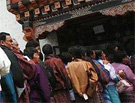
Turning towards democracy from monarchy, the Himalayan Kingdom, Bhutan on March 24, 2008 witnessed the general assembly election for the first time in the country after a long absolute monarchy. Election Commission Kunzang Wangdi has announced today that Bhutan Peace and Prosperity Party had swept 44 out of total 47 seats in this first parliamentary election while the only one opposition party People’s Democratic Party (PDP) could get only remaining three seats in the election.
Bhutan Peace and Prosperity Party originally known as Druk Phuensum Tshongpa (DPT) is currently known as the royalist party as most of the members of this party have been the ministers under King Jigme Khesar Namgyel and the head of the party Jigmi Thinley had also been the former premiere in the Bhutanese monarchy. It is said that DPT is ‘favourite’ among the elite and educated society.
On the other hand, the only opposition party PDP could manage to win only three seats in Parliament in which the party head Sangay Ngedup, a former two-time prime minister in the old royal regime and relative of former king, Jigme Singye Wangchuk could not manage to win in his own constituency.
Former King Jigme Singye Wangchuk before handling the throne to his son Jigme Khesar Namgyel on 2005 had announced to hand over the power to the people’s hand and the process of ‘democratisation’ has begun since then and ended on Monday excluding the last procedure of comprising the democratic government.
Former King Jigme Singye Wangchuk was the fourth king in the royal regime and was willing to carry the country towards modernisation and democratisation.
According to Election Commissioner Wangdi, “79 percent out of 3,20,000 registered voters have exercised their votes for 47 constituencies across the 20 district of the country.” “Despite of widespread fears of subversion by Nepal-based Maoists or Indian underground groups like the ULFA and far-flung corners of the largely rural country in tiny village (where voting machines were delivered by yak) the election went smoothly and fairly” added Wangdi. There were 94 candidates in the first election fray, as per election commission’s data.
India has contributed in Bhutan’s democratisation process by granting it 865 Electronic Voting Machines while Bhutanese Government has kept the similar number of EVMs as spare at each polling booth for casualties.
As per, Bhutanese rules and regulation, ‘Only graduates can exercise in the polling’ that’s why country is now on the move to boost the education system, as a social activist said in an interview.
For conducting a fair and smooth election, Election Commission had made mandatory to carry the ‘election Identity card’ to every voters and had also monitored closely ‘the funds’ granted to the party by the states of the nation.
Election commission had also advertised the process of first election in country by electing several means of media across the country to make aware to the general public about the first step of democratisation.
An election for 25-seated National Council, the upper house of parliament, had been already held in December 2007.
|
|
Read More: Maoist


Comments: